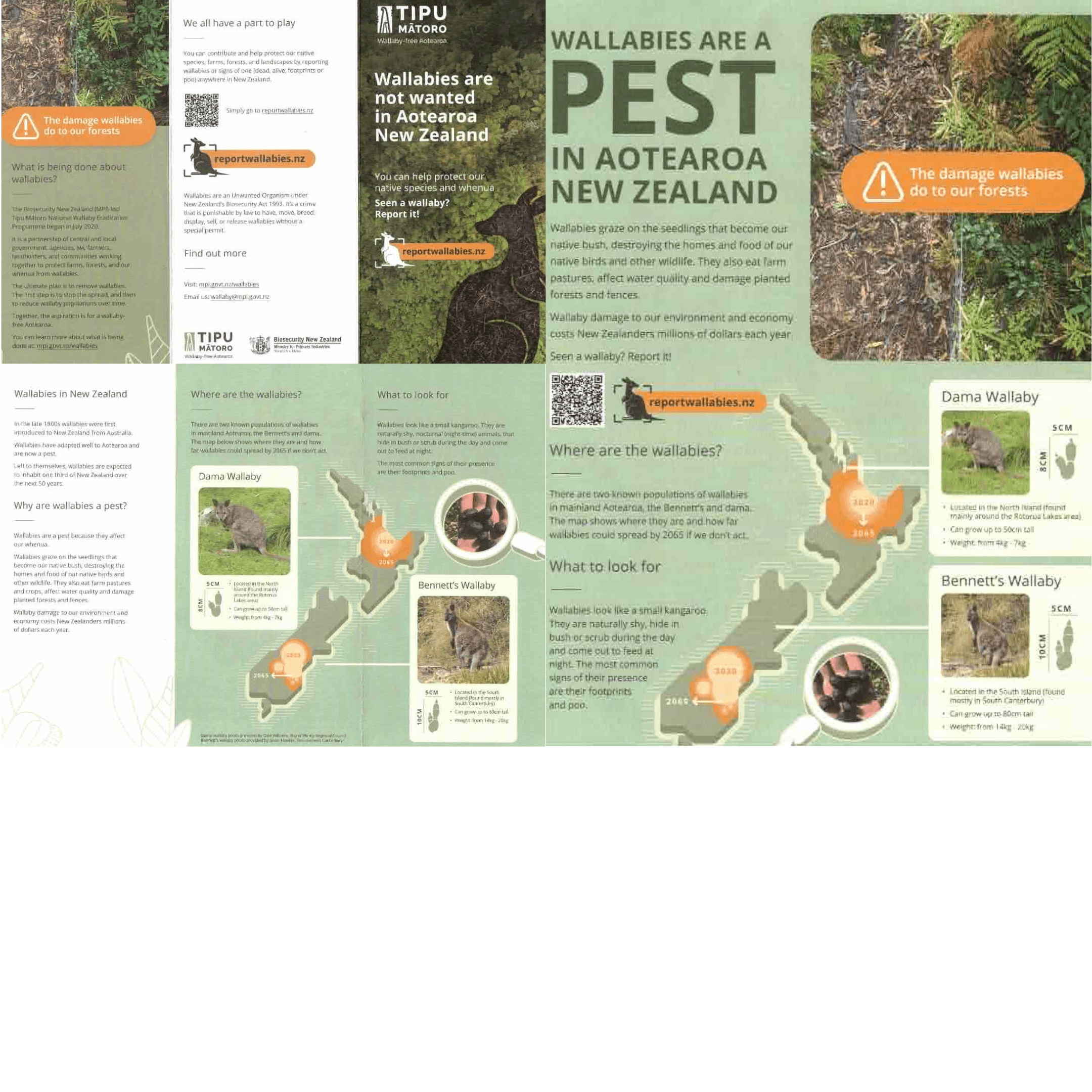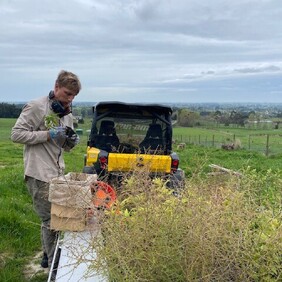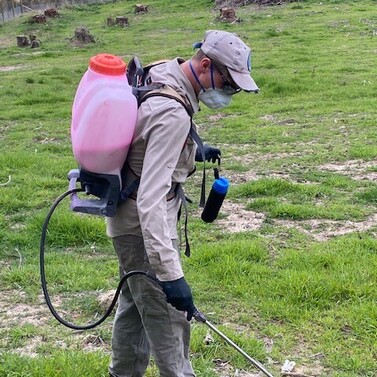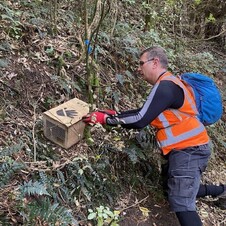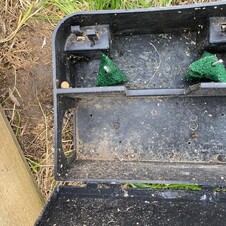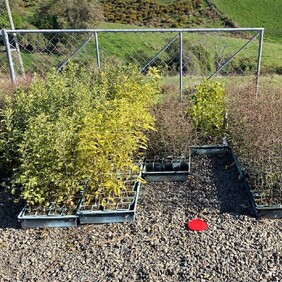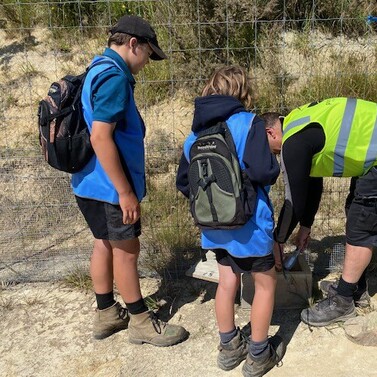November 2024
Kia ora koutou katoa
Greetings everyone
2024 has been a busy and active year and we would like to share the
various developments and progress within the Ecosanctuary with all of
our subscribers, supporters, donors and sponsors! Your continued
support is the cornerstone of the progress and development of the 5
year old established Ecosanctuary. Thank You All!
The “War on Wallabies”
The BIGGEST achievement in the past 12 months has been the
successful eradication of the remaining Bennett Wallaby from within
the Ecosanctuary! There are now NO Wallabies left inside! When the
Predator fence (enclosing the 95Ha sanctuary) was completed in June
2021, an unknown number of wallabies remained, hidden away in the
Bush. We now put that number at approx. 7-800. Wallabies are
extremely proficient at breeding and despite attempts to cull them
through staked bait (Ferotox) and night shoots by keen hunters with
night vision capability, they proved to be elusive and their numbers
kept steadily increasing. Their veracious and continuous browsing on
all vegetation growth (including all native plants), was very evident with
visible well worn trails marking their nightly traverse through the bush
and their browsing preventing any natural regeneration of native
understorey. Observations from Mountain bikers told us the numbers
were suddenly exploding.
A much more efficient and effective extermination plan was needed
and with assistance and funding provided by Environment Canterbury,
the Trust consulted specialist Contractors and was able to launch a
“war on wallabies”! In May 2023 the Ecosanctuary was closed to the
Public for a number of weeks, during which time a drop of pre-feed,
followed by baited pellets was distributed throughout the Ecosanctuary
by chartered helicopter - aerial application. This was followed up by a
period of intense monitoring by the Contractors, including flying
thermal imaging drones, positioning trail cameras, physically walking
and inspecting tracks and watching for signs of live wallaby movement
over the next few months. By December 2023 it was evident that the
war on wallabies had been won and in just a few short months, the
amount of regenerative growth of understorey in the Bush was
stunning with young native plants appearing AND, amazingly new plant
life was appearing within gorse cover. Pittosporums under the gorse
the telling indicator we had wone the battle and the war. A testimony to
Hugh Wilson’s advocacy that “by removing grazing and browsing
animals from areas of native bush, regeneration of native plants and
trees will naturally occur with the gorse cover acting as a nitrogen fixer
and protector in the early stages of regeneration. Once the regenerated
native bush has grown through the gorse to a sufficient height to block
light from the gorse...it will struggle to survive.
Hugh Wilson demonstrated this successfully at now famous Hinewai
Reserve on Banks Peninsula.
Within the Point Bush Ecosanctuary, what was once Totara Forest,
there is any amount of dormant Totara, Matai and other endemic native
tree seed species on the ground...ready and waiting to burst forth and
we are now seeing it happening!
This was a costly exercise of some $50K and made possible by specific
funding allocated to the Trust by Environment Canterbury and for
which we are very appreciative of their contribution to our successful
eradication of wallaby from the Ecosanctuary.
(Wallabies are a national PEST in Aotearoa New Zealand not only
damaging to the native bush environment but to grassed farmlands)
To find out more Visit the Ministry for Primary Industries Biosecurity
NZ website: mpi.govt.nz/wallabies.
So with the wallabies gone...it was on with the 2024 planned native tree
PLANTINGS:
In 2022 we planted 25,000 natives on the hill top of the Ecosanctuary
but held back from planting in 2023 because of the wallabies. After the
bait drop, we resumed planting this winter (2024) and have just
completed putting in a further 10,000 natives, with planting focus on
the grassy hill slope (just inside the Ecosanctuary above the start of the
Big Easy Track) and planting out the recently logged three hectare (ex
Eucalyptus firewood block) on the lower northern section of the
Ecosanctuary. Funding for plants and planting costs has been covered
through a successful application made to MPI One Billion Tree Fund by
the Trust in 2020. Local contractor, Matt Wolf (Waimate Landscaping)
was engaged to prep sites and plant out and along with Gary Dennison,
has spent many hours in the past two months getting 10,000 plantings
in the ground. See photos on the Ecosanctuary website.
www.pointbush.co.nz. Several sessions were organised with
Volunteers assisting to place plant protectors, but with no wallabies,
there is no longer a browsing threat, protectors are not so essential.
Upgrade of 4wd vehicle access track
In May 2024 the Trust engaged local earthworks contractor James Davis
to undertake logging of the 3 Ha Eucalyptus block (in preparation for
native tree planting), plus scooping out to enlarge the lower pond as a
firefighting resource.
The “Back Track” as it’s called required extensive re-grading work to
grade the deeply rutted surface track and inset drainage coils to
counter the excessive water run off. This was an essential upgrade to
provide an all weather track for vehicle access and for an emergency
vehicle route.
New track directional signage:
The walking and MTB biking tracks within the Ecosanctuary continue
to be popular, attracting many visitors to stop by and enjoy the variety
of recreational tracks leading to the White Horse Monument at
Centrewood Park.
There’s been an urgent need to install directional signage and this has
been no small task. With support and funding co-ordinated by local
groups Waimate Trackways, Whitehorse MTB Riders, Waimate2gether
and Waimate District Council (Recreational Track Grant), we are
nearing completion of a long and complex project to provide
Standardised Directional Signage with colour coded track maps for the
many tracks within the Ecosanctuary, including the White Horse
Walking track and Big Easy.
Pest trapping & protection of native birds
Although the wallabies are no more, there are still possums, rats, feral
cats and mustelids to deal with. There are a number of traps set out in
the Ecosanctuary - trap lines - all numbered with GPS positions and
checked weekly. This trapping detail is logged onto TrapNZ and can be
viewed online. When attending the annual SONZI (Sanctuaries of New
Zealand) Conferences the message is always...”it’s not what you are
catching BUT what you are not catching”! The cunning psyche of
weasels, ferrets, rats and possums...even mice is not to be under-rated.
Effective trapping is a constant mind game, the type of bait (visual or
odorous and even colour) plays a big part. Possums are attracted by
white and yellow colours! They also go for aniseed and mayonnaise!
Rats are so cautious and rarely get caught in a trap. They go for the
spiked bait in tunnel boxes as do mice.
Traps & bait
They all cost and we are delighted that The Trust has been able to
purchase additional traps this year through the generosity and support
from a number of Donors, including:
Waimate Federation of Women’s Institute donated $500 for traps
GiveALittle Donations - collected in 2024 - $595
GiveATrap donated a further 2 traps (an annual support)
Canterbury Aoraki Conservation Award donated $2,300
QEII donated $2,300
Other donations have been made by Donors in the Sponsors category
That acknowledges Donors with a fence post Name Plaque
(Photos of Name Plaques are on the Ecosanctuary website) along with
Details of Sponsors categories.
DONATIONS are always welcome and appreciated. They help cover the
trapping costs and enable the Trust to implement the various projects
(listed on the website).
Donation can be made through the website
www.pointbush.co.nz
CURRENT PEST COUNT: (tally below is since trapping commenced in
January 2021 - data is submitted to the National Trap App:
Possum 278
Rats 60
Weasels 45
Ferrets 1
Stoats 24
Feral cats 17
Hedgehogs 124
Rabbits 8
Mice - unknown as they take up bait in tunnel bait boxes
Trapping Volunteer, Danny has been a super star regular trapping
volunteer and supporter of the Ecosanctuary since 2019. We would
always welcome other volunteers interested to help with checking
traps.
PEST WEEDS: Apart from pest predators - there’s notifiable PEST
WEEDS to be dealt to including Banana Passion Fruit, Barbary etc.
Volunteers interested to assist are welcome to get in touch. We tend to
follow a cut and paste application when we find them.
To help support the Point Bush Ecosanctuary as a Volunteer for either
PESTS or PEST WEEDS or BIO DIVERSITY interest do contact us :
pointbushecosanctuary@gmail.com
NATIVE BIRDS
There is a very evident marked increase in the volume of birds and
birdsong this Spring time! With the reduction in predators, the bird life
is thriving and apart from regular bush birds such as korimako
(bellbird), tui, piwakawaka (fantails), riroriro (grey warbler), regular
sightings of titipounamu (Rifleman) are becoming common along with
karearea sightings.
INVERTEBRATES : LIZARDS & GECKOS
Bio-diversity plans were put on hold during the Covid period. We had
structured a Bio-diversity day and invited specialists and experts in
plants and invertebrates to spend a day in the Ecosanctuary identifying
plant, fauna and invertebrates. We plan to re-schedule.
Full protection in perpetuity
The other BIG achievement in the past few months has been a signed
agreement by the Trust with QEII, placing the Point Bush Ecosanctuary
in protective Covenant - in perpetuity! A Safe Haven for Forest and
Bird forever! The Trust has received grant funding of $2,300. Thank
You QEII.
Visitors - schools & groups:
We are always delighted to welcome visitors to the Ecosanctuary
and recently enjoyed a return visit by the Kiwi Conservation Club, the
Waimate Scouts and Centennial School who walked from their school
all the way to the top of Point Bush Road to the Ecosanctuary...and then
walked the loop track in the sanctuary. Lunch at the Visitor Centre
revived everyone, ready for the return walk back to school! Well done!
It was a big walk but undertaken with enthusiasm and energised by all
they saw.
There are a number of photos plus additional information on the
Website www.pointbush.co.nz
Including Point Bush Wine stocks - purchase of available wines with
proceeds going towards the Ecosanctuary (Age 18+ ) applies.
We can be contacted by email: pointbushecosanctuary@gmail.com
Nga Mihi
The Trustees
Point Bush Ecological Restoration Trust
September 2024 - Local contractor Matt Wolf Waimate Landscape Ltd Contracted to plant native trees and plants in the EcoSanctuary
The 2 Ha area being planted out in the EcoSanctuary this Spring was once known locally for kai gathering, herbal and medicinal plants. The variety of native trees and plants being planted include Kahikatea, Totara, ti kouka, Manuka, kanuka, korimiko, Horipito, coprosma, lemonwood and pittosporum. Over 5,000 native trees have been planted this Spring 2024.
September 2024 - Possum Incursion
The wallaby menace is no longer a threat within the ecosanctuary but were were mystified as to why the possum numbers within the sanctuary seemed to continue to be high despite the numbers being trapped. An inspection of the northern boundary electrified predator fenceline revealed telltale scat and claw marks on fence strainer posts, indicating possums were launching themselves up and over into the sanctuary. War! Additional metal sleeve protectors have now been placed on fence stainers as a deterrent plus further vigilant monitoring with trail cameras to be set up.
Volunteer Danny checks traps weekly. We were able to lay an additional trapping line in July (with purchase of new traps from donated funds ). Details of catch are entered weekly into the online Trap NZ data base. Data recorded from the EcoSanctuary since trapping commenced in 2021 :
Wallaby 0 this year but previous numbers 488
Possum 274
Hedgehogs 124
Rats 60
Weasels 43
Stoats 24
Feral cats 17
Rabbits 8
Mice
It’s unknown the exact number of rats and mice taken out by eating bait in the tunnel
Bait boxes set out in the EcoSanctuary.
A variety of Bait is used depending on possum traps (apple and aniseed ) is effective whilst compressed rabbit is effective in traps set for mustelids.
August 2024 - SONZI Conference
Point Bush Ecosanctuary is a member of The Sanctuaries of New Zealand (SONZI)In August, Trust members Gary and Ann Dennison, along with Ecosanctuary regular Trapping Volunteer Danny attended the SONZI 2024 conservation conference held at Orokonui Ecosanctuary - Te Korowai o Mihiwaka near Dunedin. The 3 x day conference/workshop with some 110 delegates from all over New Zealand gathered and "plugged in" to vibrant sessions, presentations and workshops culminating in a guided tour around the ecosanctuary. SONZI gatherings always provide a wonderful opportunity to share discuss and meet many other participants and presenters, including this year students from Otago and Canterbury Universities. Presenters (specialists in their fields) covered a wide range of topics provoking much to discuss, much to cause concern as well as much to celebrate as accomplished achievements. There was non-stop conversation buzzing....highlighted by the fabulous venue and equally fabulous catering provided by "His and Hers" caterers based in Port Chalmers. SONZI annual conferences provide a unique opportunity and great opportunity for conservationalists and those involved in many of New Zealand's sanctuaries around the motu to come together to discuss share wins, challenges and aspirations. The conference was held over three days from 13th - 15th August 2024 with the venue being the delightful architecutral designed Orokonui Visitors Centre and Horipito Cafe , elevated at some 500m with panoramic views over the 307 Ha fenced ecosanctuary near Dunedin. An ecological wildlife reserve developed by the Otago Natural History Trust in the Orokonui Valley between Waitati and Purakaunui.www.orokonui.nz#kakaCam now has a live 24/7 camera situated in the sanctuary focused on a busy Kaka bird feeding station. a
July 2024
Volunteers from Waimate High School - William Pike student group - assisted in preparing plant protectors We have successfully re-used old vineguards cut in half as plant protectors. A Big Thank You to the many VOLUNTEERS who helped place protectors on plants and braved tackling the steep hill slope to place protectors on new plantings PHOTOA variety of 4,000 native trees and plants have been planted out to-date with further plantings continuing through to end of September.
June 2024
We welcomed a return visit by members of the Kiwi Kids Conservation Club to the Ecosanctuary on Sunday 9th June. Scout Leader Win Parkes and family members organized an exhilarating game of "Robbing the Nest" whereby young KKC members were grouped into competing teams and assigned "predator masks" - rats, weasels, ferrets, possums. Each team had a "nest of eggs" to protect, but the game was to rob each others nests at a whistle signal and call of a name entitling Rats or Possums to rob each others nests. An excitable "battle" commenced and the winners with the most eggs at the end of the game won! PS. The "eggs" were just stones and not real eggs! We always enjoy the annual visit from the KKC Club and know that they are keenly involved in conservation and protection of native birds and forests. June also saw welcome funds received with further donations from members of the Public and from the visiting Kiwi Kids Conservation groupDonations enabled the Trust to purchase 2 x carrier planting frames (for contractors to carry a number of native seedlings when planting out).Give-A-Little donations on line were also received.
An annual $500 sponsorship was also received from HC Partners Accountants (Waimate and Timaru) for which the Trust is very appreciative.
June 2024 - Mountain Bike Trails
Progress continued on tracks by members of the Whitehorse MTB Riders and a contracted track maker working on MTB specific tracks. Once tracks are all finished there will be new directional track signage plus an overall Map featuring all tracks and color coded. The aim will be to have this as an AP for those walking and biking the recreational tracks within the Ecosanctuary. The Trust is working closely with Waimate2gether, Waimate Trackways and Members of the MTB Whitehorse Riders. with funding through the Waimate District Council Recreational Track grants.
April 2024 - DONATION FOR TRAPS
The Trust was delighted to receive a donation of $500 from the local Waimate Women's Federation to go towards purchasing traps for the Ecosanctuary's predator trapping programme. The Trust duly purchased 2 x new possum traps and these are now set out in the ecosanctuary in a new line of traps allowing more coverage in the ecosanctuary and being put to effective use.Thank You to Pauline Thomas and the Women's Federation group!
April 2024 - GIVE-A-TRAP
A further 2 x possum traps were also donated through Give-A-Trap for which the Trust is very appreciative.
April 2024 - Support by Waimate District Council
The non-rateable status applied by WDC & E-CAN to the 95Ha Ecosanctuary was verified by Council. The Trust is very appreciative for Council's and E-CAN's ongoing support in this way.The "NO DOGS in Ecosanctuary" byelaw status was also reinforced by Council.
March 2024 - Whitehorse Walkway
Track maintenance was undertaken with additional 10 x buckets of shingle being added to the steps formed last November. Albeit a bit of a "work out", the formation of steps on the steep sector of the walkway has really been an improvement in what was once a very slippery slope! The steps have worked really well. Waimate Trackways volunteers help keep this track maintained.
March 2024 - VISIT TO THE ECOSANCTUARY BY MPI
(One Billion Trees programme)
Funds received through the OBT scheme paid for 10,000 native trees to be planted in 2022 on the hill top. As part of the funding scheme, a follow up visit by personnel in mid March who spent the day reviewing planting and progress.
February 2024 - Attention to the Vehicle Access Track was Addressed
As an H & S concern, the Trustees approved upgrade work of the 4WD back track in the ecosanctuary for vehicle access up the hill. The track was re-graded by contractors and a much improved wide surface vehicle access track has made a big difference; especially as there is now a much improved run off (drainage), allowing heavy rain to run off the track and preventing scouring out and exposing jagged "rotten rock " that used to slash tires. A great improvement.
February 2024 - Extended plantings
Now that the wallabies are no longer a threat to new plantings, we were able to commence with plans to expand native tree planting within the ecosanctuary. In February a 2 Ha stand of eucalyptus trees were logged to clear fell an area in preparation for winter planting of natives with walking track access.
February 2024 - Point Bush Ecosanctuary now without Wallabies!
It's a fact! The remaining wallaby "gang" that was hiding out in the bush in the predator fenced ecosanctuary ever since 2021 (when the predator fencing was completed) are now gone!
No more wallabies to graze on regenerating native bush or browse on newly planted native plants!
It's been a mission and a half to finally get to a wallaby-free status!
They are an imported menace and the battle continues on to manage their numbers and prevent their spread. The PBERT Trust is very grateful and appreciative to local Contractors and OUR THANKS to the funding support from Environment Canterbury (E-CAN) that enabled the successful eradication of Bennett wallaby from the 95Ha Ecosanctuary.
